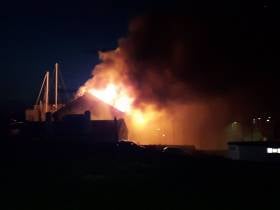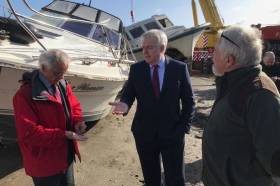Displaying items by tag: Holyhead Marina
Crews in Wales Fight 'Devastating' Fire on Holyhead Marina
#CoastalNotes - In north Wales, fire crews BBC News reports have been fighting a large blaze at a workshop on Holyhead Marina.
An eyewitness said "30ft high flames" were coming out of the roof of a marine engineering workshop after reports of an "explosion" on social media.
North Wales Fire Service had four crews tackling the fire on Anglesey, which started at about 21:10 BST on Thursday.
Ynys Mon MP Albert Owen tweeted there were "no reported injuries" and the area around the Holyhead RNLI station was evacuated as a precaution.
"Emergency services have the matter under control," he added.
Holyhead Port, one of the UK's busiest ports with daily ferries to the Republic of Ireland, said the fire was not affecting its operations.
The Welsh Ambulance Service said it had been made aware of the fire but paramedics were not required.
The fire service confirmed the blaze had been brought under control by 23:30.
For more on the incident, the BBC has more by clicking here.
#Holyhead - The north Wales marina in Holyhead wrecked in a storm which saw dozens of vessels sunk or damaged is to receive a £100,000 Government cash injection to help with the ongoing clean-up.
Storm Emma reports Daily News, battered the coast in March of this year, wreaking severe damage on Holyhead Marina as well as around 75 vessels.
Since then, significant progress has been made to clean up the area, with an estimated 40 tonnes of polystyrene and 3,000 litres of oil recovered from the marina and neighbouring beaches.
This has been made possible thanks to the efforts of a multi-agency team involving Anglesey Council, NRW, and the Coastguard among others, and the time and dedication shown by local volunteers.
During a visit to the marina this morning (MAY 10) First Minister Carwyn Jones said: “From day one agencies and volunteers have worked tirelessly on the clean-up and I saw for myself the dedication and professionalism of those involved. I thank them for all they have done and continue to do.
To read further comments by the Welsh First Minister, click here.
Last month on the other side of the Irish Sea a group of cadets visiting Greystones as previousy reported ironically found debris from the damaged marina washed ashore

























































